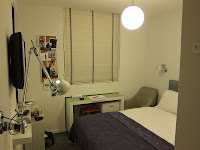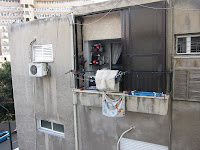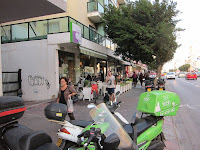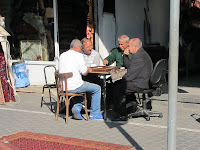As you probably have noticed from my recent postings, I continue to have problems with my left hand. On Saturday, when we had to change the tire, I had to lift up both the flat tire and the spare, which put a lot of pressure on the stitches. I don't think the sulphur water helped any either.
By Sunday, the area had started to be tender, and by Monday morning, there was no question of infection. Last night I reached Ofer, who recommended a doctor, but I couldn't call him until this morning. In the meantime, the area around the stitches had become red and swollen and was very painful to the touch.
I slept quite fitfully and woke up early (5 am). I ate breakfast early and called the doctor as soon as his office opened at 8 am. When the receptionist realized that I wasn't on the
kupat cholim plan, she had me speak to the doctor and he said to call back at 3:15 pm to find out when I could come.
In the meantime, we began the process of checking out of the hotel. Dad and Rochelle arranged to keep their rooms late, and I moved my stuff into my parents' room. Then, all of us except Rochelle piled into Aryeh's car for a tour of his and my father's war-time exploits. It was sort of exciting, with Aryeh veering from lane to lane, narrowly missing cars, trucks, and mopeds, all while speaking with both his hands animated, and off the steering wheel.
He'd brought along a book of their brigade's exploits. Soon enough we were in south Tel-Aviv, looking for the road to Bet Dej'n. Along the way, we saw dozens of Sudanese day laborers lining the roads. These are economic refugees fleeing the violence and poverty in the Sudan. They come into the Sinai, but the Egyptian border guards shoot and kill them if they try to cross into Israel.
In the winter of 1948, Aryeh and dad were stationed in Bet Dejn (no Bet Dagan) also known as Bet Keren Hakayemet. This was the main road running from Rammaleh to Jaffa, and the Haganah wanted to intercept the communications and control this strategic route. It was just south and east of Tel-Aviv, next to Mikve Yisrael. This was, they said, an area of 15,000 Arabs, with 15 Haganah fighters in this post.
Mikve Yisrael is a major part of early Zionist history. Founded in 1870 or there abouts, it was run by the Alliance Israelite Universelle as an agricultural school. Heinrich Graetz visited in 1872 and wrote a glowing report about their activities. By 1948, most of the school had either enlisted or been evacuated to Tel-Aviv.
Bet Dej'n consisted of a house adjacent to the road, a well, and "bunkers" in the back. Every night, the Arabs attacked, and every day, the phone line crews arrived to repair the damage from the night before. These work crews were Arabs, so the Haganah told them the courtyard was mined and they had to carefully walk through it to avoid being blown up. They then did an elaborate pantomime of how they had to walk. In fact, there were no mines in the courtyard.
At one point, before the bunkers were finished, the Arabs rolled a barrel with explosives into the building. All the photos I've seen of it show a partially blown off front facade, but I don't know if that was a result of the barrel.
Twice a day, the British drove up and down the road and no one touched them. One time as the British approached, one Haganah soldier dropped his sten gun from the balcony and it landed right in the middle of the road. The Australian commander stopped the convoy, picked up the gun, handed to the Haganah soldier and said "here, you're going to need this." Both Aryeh and dad agreed that the Aussies and the Scots were better than the Brits.
Almost none of the base remains. There are the ruins of the well, but all that remains of the house is a monument to the Haganah soldiers who fell here. Aryeh told us how one time the Arab fighters were led by a German. He called out in German: "you have until 10 to surrender or we will attack." Then he counted down in German: "Zehn, neun, acht, sieben..." When he got to zero, everyone held their breath. Silence. He was bluffing. One time someone through a grenade at the building and it got caught in the protective bars on the window. One of the soldiers hit it, so it flew off and exploded harmlessly.
From there we drove past the police station (just a few blocks away), outside of which dad was shot. It was a Scottish patrol that took him to the hospital.
After that we drove back to Tel-Aviv. On the way we passed what looked like a prison, but which dad and Aryeh said was an army training base. Dad described how they would sometimes go AWOL, by throwing a blanket over the barbed wire and climbing out. "How would you get back in?" I asked. By standing at the front gate and pretending they were trying to leave. "The army wasn't very organized," dad explained.
When we got back to the hotel, we learned that our Delta flight back to the State had been cancelled. Dad took a taxi off to Jaffa to the Delta office, while mom and I grabbed lunch at Mersand. Since dad wasn't there, I got the salami sandwich with mayonaisse (delicious), while mom again got the goat chese with vegetables.
One the way back to the hotel, I was surprised to see dad, who looked very impassive. He has a good poker face. Thumbs up or thumbs down, I signed. Thumbs up. We have tickets for the same flight but one day later, but even better we've been bumped up to business class! While dad got a ticket for Rochelle on the same flight, there were no business seats available. Even worse, she has a 9.5 hour layover at JFK. None of us has dared tell her yet about the difference in the quality of the seats. Even so, she's very upset about the layover and is going to try to change the plans tomorrow.
Dad and I then walked down to the Carmel Market. I missed Mahane Yehuda in Jerusalem, so this was a real treat. I love markets, but here I was able to buy clean socks for tomorrow. Dad pointed out the first gas station in Tel Aviv and a few buildings that held very cheap movie theaters. We looked at all the vegetables and olives, and marveled at one shop for hummus that looked like a synagogue devoted to the stuff. I remembered there was a used bookstore in the area and eventually found it, but it was closed for the day. I'm going to try again tomorrow.
On the way out of the market, we stopped at a building that dad said used to be a Berlitz school in 1947. In November 1947, this was the place where the UN partition vote was broadcast. Dad said that the entire square was full and no one could drive past on Allenby. After the vote, every one danced and partied.
Back at the hotel, we caught a taxi to my doctor's appointment. I was the last patient and he took down my details. He decided to take out the stitches, but couldn't find the equipment. "The nurses usually do this," he explained. Since he was literally moonlighting by taking me as a private patient, he didn't know where they were. Finally, he took out some scissors for cutting paper, swabbed the area to disinfect it, and tried to cut it. Unfortunately, the stitches were pretty tough, so he tried to search again, in vain. I told him to go ahead with the scissors he had, and this time he got it. The first one was the hardest, as the area was the most inflamed, and the second one went quicker.
He gave me prescriptions for antibiotic ointments and pills, and I asked if I should cover the area with a bandage. "No," he said, "just a plaster." The doctor was South African, and in Israel they follow the British Commonwealth practice of calling bandaids "plasters." It's been about 4.5 hours and the area is still sore, but not sharply painful as it was earlier today. Hopefully, I'm finally on the mend.
I asked Ofer to recommend a good, light restaurant, and he suggested
Hadar ha-ohel next to the New Opera House. I asked what type of restaurant it was and he said "new Israeli cuisine." I met everyone at happy hour in the hotel breakfast room and they agreed. The concierge made us reservations and told us that the restaurant's chef is a young, famous, up-and-coming chef.
Rochelle wasn't entirely pleased, thinking that this would be like one of the restaurants at the Music Center, but it was much nicer. Basically, they take traditional Israeli foods and reimagine them in interesting ways. The starters were all great: the grilled cauliflower was tart and tasty, the beet salad was very citrusy, and the veal kubeh was delicious. Dad was ecstatic over the very seedy fresh bread. Mom absolutely loved her veal stew, while dad very much enjoyed his lamb kebab. Rochelle had the schnitzel, while had the chicken scalloppini. It was very good (and I particularly liked the garlicky flat beans), but the portions were all too big, and none of us finished our meal.
After that we came back to the hotel to prepare for tomorrow. Dad and I will go to the Haganah museum in the morning, and mom and I will go to the Tel Aviv Art Museum in the afternoon. I'm hoping to meet Ofer at 3 pm, and then tomorrow night, God willing, we'll be on our flight back to the States. I hope so, because after tomorrow I will have no more clean clothes.






















































































